人教版八年级上册Unit 9 Can you come to my party?SectionA Grammar Focus-3c 课件 (共23张PPT)
文档属性
| 名称 | 人教版八年级上册Unit 9 Can you come to my party?SectionA Grammar Focus-3c 课件 (共23张PPT) | 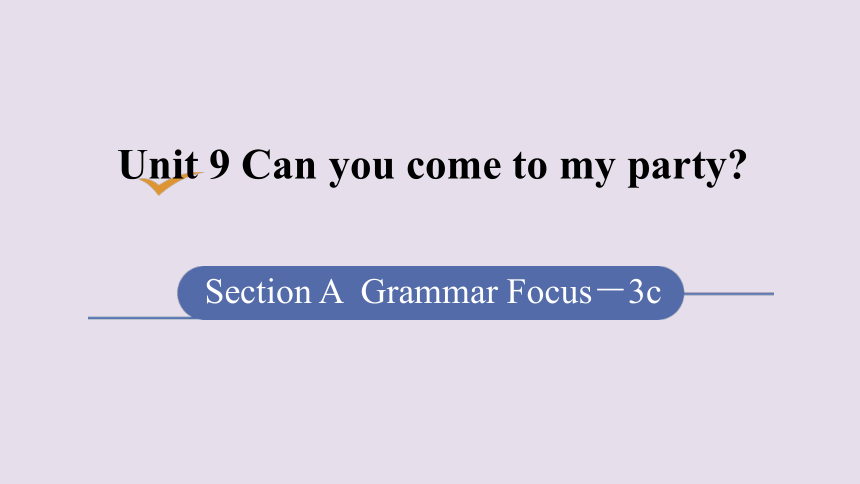 | |
| 格式 | pptx | ||
| 文件大小 | 2.4MB | ||
| 资源类型 | 教案 | ||
| 版本资源 | 人教新目标(Go for it)版 | ||
| 科目 | 英语 | ||
| 更新时间 | 2022-12-13 14:07:31 | ||
图片预览

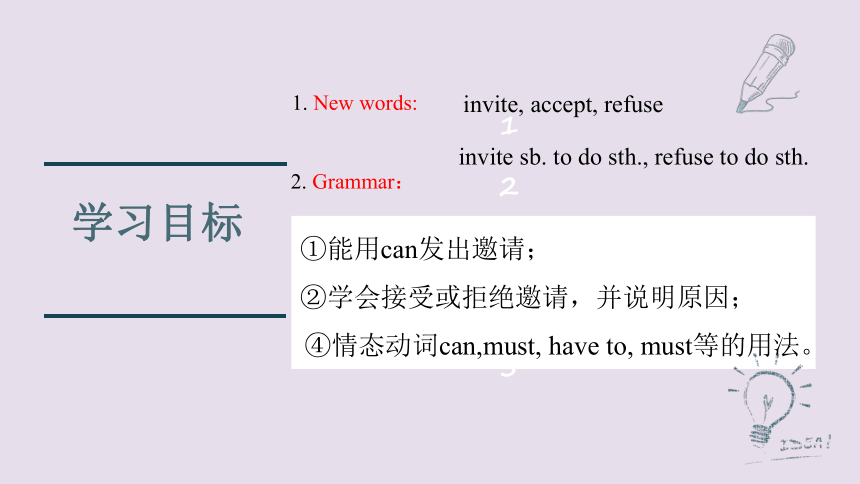
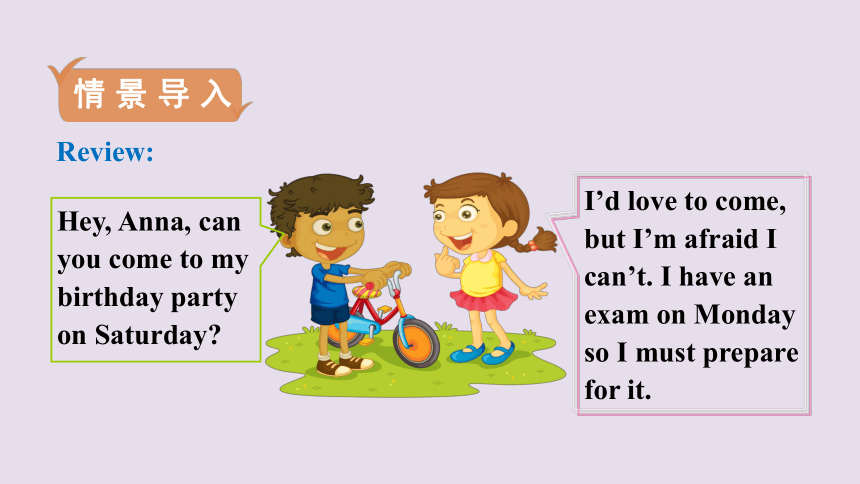
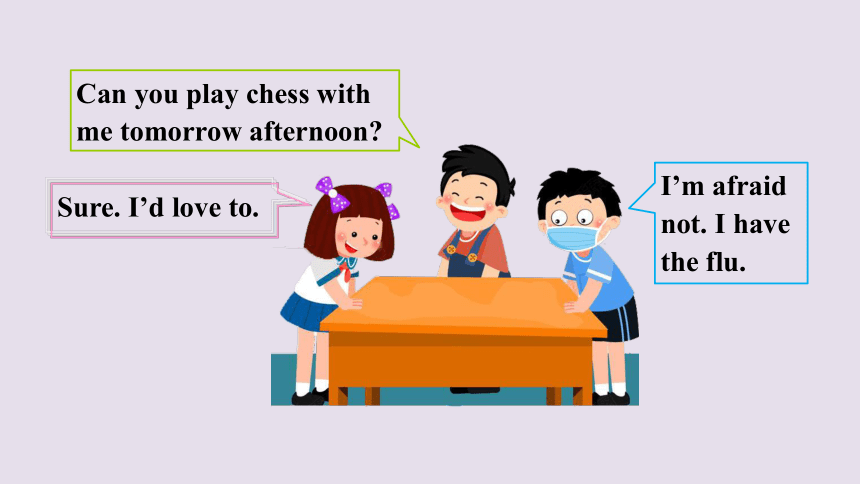
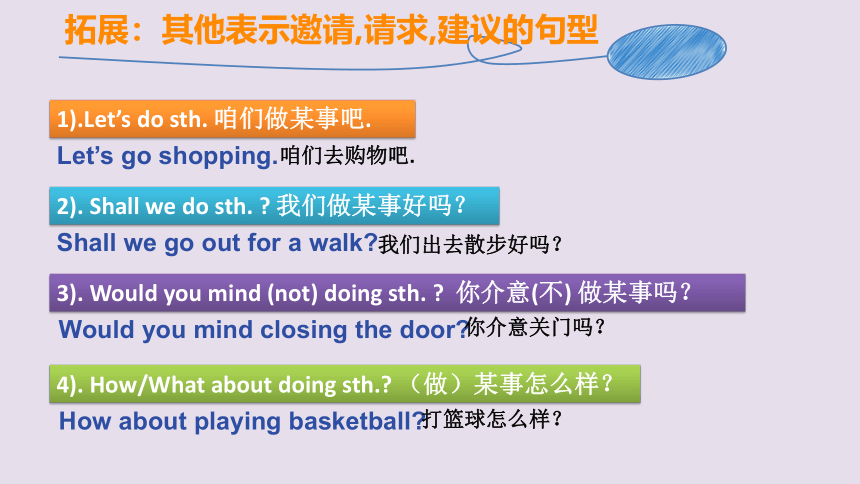
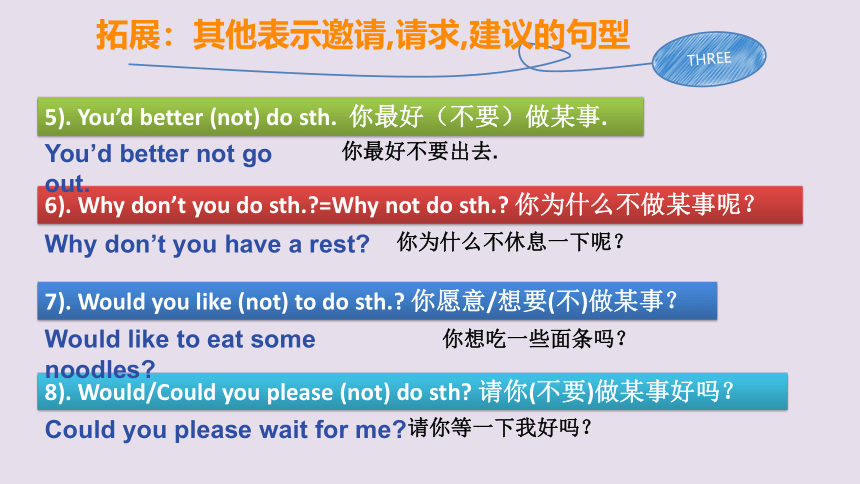
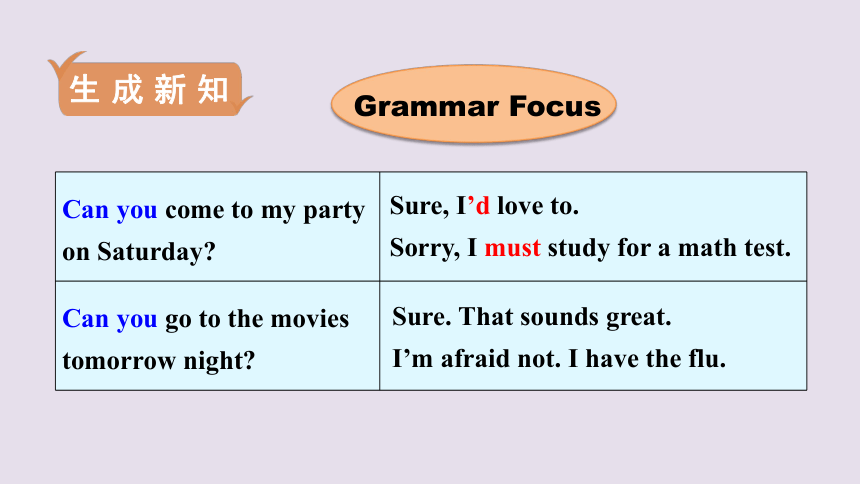
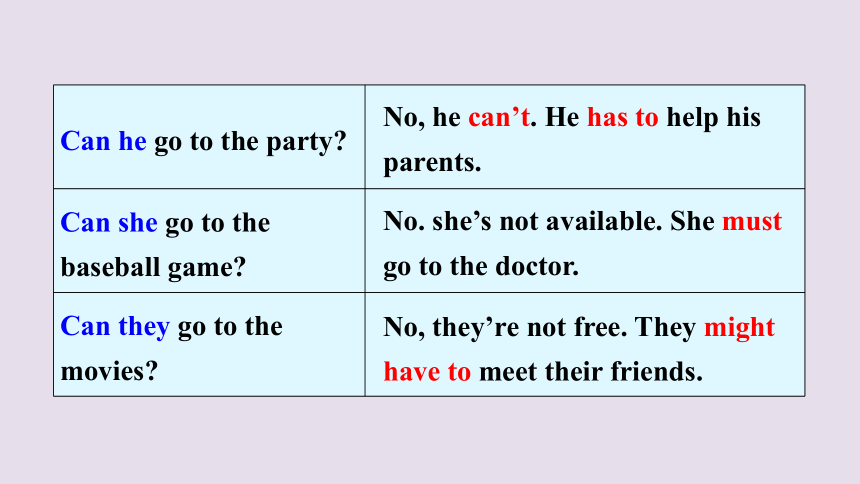
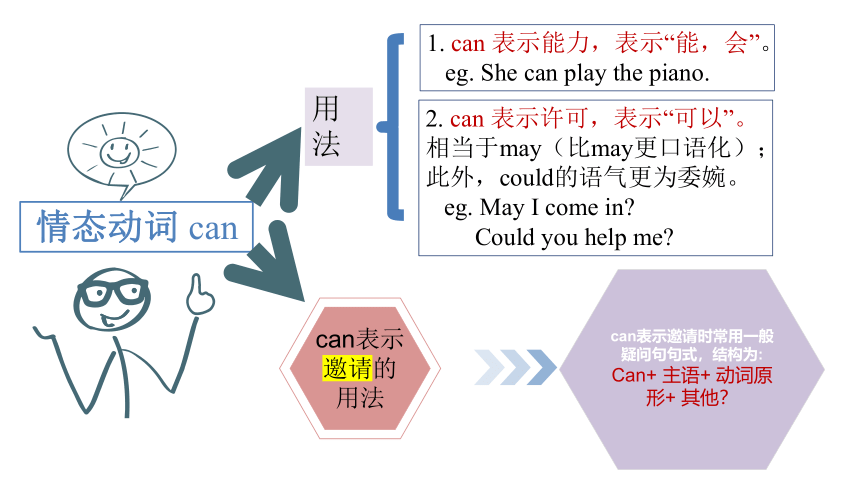
文档简介
(共23张PPT)
Unit 9 Can you come to my party
Section A Grammar Focus-3c
学习目标
5
4
3
2
1
1. New words:
2. Grammar:
invite, accept, refuse
invite sb. to do sth., refuse to do sth.
①能用can发出邀请;
②学会接受或拒绝邀请,并说明原因;
④情态动词can,must, have to, must等的用法。
情景导入
Review:
I’d love to come, but I’m afraid I can’t. I have an exam on Monday so I must prepare for it.
Hey, Anna, can you come to my birthday party on Saturday
Sure. I’d love to.
Can you play chess with me tomorrow afternoon
I’m afraid not. I have the flu.
拓展:其他表示邀请,请求,建议的句型
1).Let’s do sth. 咱们做某事吧.
2). Shall we do sth. 我们做某事好吗?
3). Would you mind (not) doing sth. 你介意(不) 做某事吗?
4). How/What about doing sth. (做)某事怎么样?
咱们去购物吧.
Let’s go shopping.
Shall we go out for a walk
我们出去散步好吗?
Would you mind closing the door
How about playing basketball
打篮球怎么样?
你介意关门吗?
THREE
拓展:其他表示邀请,请求,建议的句型
5). You’d better (not) do sth. 你最好(不要)做某事.
6). Why don’t you do sth. =Why not do sth. 你为什么不做某事呢?
7). Would you like (not) to do sth. 你愿意/想要(不)做某事?
8). Would/Could you please (not) do sth 请你(不要)做某事好吗?
You’d better not go out.
你最好不要出去.
Why don’t you have a rest
你为什么不休息一下呢?
Would like to eat some noodles
你想吃一些面条吗?
Could you please wait for me
请你等一下我好吗?
Grammar Focus
生成新知
Can you come to my party on Saturday
Can you go to the movies tomorrow night
Sure, I’d love to.
Sorry, I must study for a math test.
Sure. That sounds great.
I’m afraid not. I have the flu.
Can he go to the party
Can she go to the baseball game
Can they go to the movies
No, he can’t. He has to help his parents.
No. she’s not available. She must go to the doctor.
No, they’re not free. They might have to meet their friends.
情态动词 can
用法
1. can 表示能力,表示“能,会”。
eg. She can play the piano.
2. can 表示许可,表示“可以”。
相当于may(比may更口语化);此外,could的语气更为委婉。
eg. May I come in
Could you help me
can表示邀请时常用一般疑问句句式,结构为:
Can+ 主语+ 动词原形+ 其他?
can表示邀请的用法
▲
情态动词主要有:may / might, can / could, shall / should, have to, must, will / would, ought to, need, dare, used to.
(1) 不能独立作谓语,只能和动词原形一起构成谓语,表示说话人的
语气和情态。
(2) 没有人称和数的变化 。(have to 除外)
(3) 否定形式:在其之后加not 。(have to 除外)
疑问形式:情态动词提到主语之前。 (have to 除外)
1. 情态动词
问题探究
might , can, must 它们都是____动词,用来表达某种感情。
1.might 意思是“________”。
2.can 意思是“________”。
3. must 意思是“______”。(主观)
4.have to 意思是“______”。(客观)
Grammar
情态
必须
不得不
能;会
可能;也许
▲
2. 情态动词Can的常见用法:
(1) 表示能力:情态动词can一般指体力、知识、技能等方面的能力,即“能够;会”。如:
My brother can swim but I can’t. 哥哥会游泳,但是我不会。
(2) 表示许可:多用在口语中,表示请求或允许,意为“可以;能够”等。如:
Can I use your pen 我可以用你的钢笔吗?
(3) 表示推测:情态动词can表示推测时,常用于否定句或疑问句,意为“(不)可能”。用于肯定句中,意为“有时会”。如:
It can be very cold here in spring. 这里的春天有时可能会非常冷。
(4) 表示邀请:情态动词can除了表示能力、许可或猜测之外,还可以表示邀请;could较can更礼貌、委婉。表示邀请时的用法如下:
① 当用情态动词can发出邀请时,用一般疑问句 Can+主语+动词原形+其他?如:
Can you come to my party 你能来参加我的聚会吗?
▲
2. 情态动词Can的常见用法:
② 当用情态动词can发出邀请时,其回答分为两类。一类表示接受邀请,另一类表示拒绝邀请。如:
Sure, I’d love to. 当然,我很乐意。
Sure, I think he she will. 当然,我想她会的。
Sorry. I’m not available. 对不起,我没有空。
I’d love to, but I’m afraid I can’t. 我很乐意去,但是恐怕我不能去。
(1)may也可表示邀请, 注意其否定回答为“No, 主语+ mustn't/ can’t”。
—May I go now ——我现在可以走了吗?
—No, you mustn't. ——不,你不能走。
(2)may表示说话人的猜测, 认为某一事情可能发生,其否定结构为may not, 其过去式为might not。
eg. The newspaper says that it might rain.
(3)might表可能,其语气比may更委婉,更加不确定。
His parents might come today. 他父母今天可能会来。
▲
3. may与might
▲
4. can 与 may
(1) 都可表示“许可” 。may用于较正式、客气的场合,而can比较随便(口语)。如:
You may / can sit here.
The policeman says you can’t park here.
(2) May / Can I… 表示征询对方许可。Can you… 表示请求。
— May I use your phone
— No, you can’t. / No, you mustn’t.
拓展--其他情态动词
1. must/have to的用法
(1)must表示“必须”或“应当”,其否定式为mustn't。
以must开头的一般疑问句的肯定回答为:Yes, 主语+must;
其否定回答为:No, 主语+ needn't.
eg. --Must I finish my schoolwork today 我今天必须完成我的功课吗?
--No, you needn’t. 不,你不需要。
(2)have to也表示“必须,不得不”。
一般情况下,must表示说话人的主观看法,而have to 表示客观需要。
(3) 注意: must还可以表示推测 ,“一定” eg. It must be delicious. 它一定很好吃
3a
Complete the answers with might and one of the phrases in the box.
1. A:What are you going to do on Saturday
B: I'm not sure. I might___________________________
2. A:What are you planning to do after school
B: I don't know.__________________________
3. A:When will you finish the science homework
B: ____________________________________
4. A: Who are you going to the movies with
B:______________________________________
5. A: Are you free to come to my place on Saturday
B:___________________________________
watch TV
on the weekend
my cousin
visit my grandparents
practice the violin
I might watch TV.
I might go with my cousin.
visit my grandparents.
I might finish it on the weekend.
I might practice the violin.
Complete the sentences below. Use the words in brackets to help you.
3b
1. Inviting:___________________________(can/play tennis)
Accepting:______________________________
2. Inviting:________________________________
(would like to/go to the movies)
Refusing:_____________________________
Reason:______________________________(might have to)
Can you come to play tennis
Sure, that sounds great.
Would you like to go to the movies
I’m afraid not.
I might have to do my homework.
3. Inviting: __________________________________
(can/hang out with us tonight)
Refusing: _________________________________
Reason: __________________________________(must)
4. Inviting: _________________________________________
(would like to / come to my birthday party)
Accepting:________________________________
Can you hang out with us tonight
No, I can’t.
I must practice the violin tonight.
Would you like to come to my birthday party
Sure, I’d love to.
I will have a birthday party this Saturday!
Name Accept Refuse (Reasons)
Li Li
Who can come to my party
Write down everything you have to do next week. Choose a day and time to have a party. Then invite classmates to your party.
3c
A: Can you come to my party
B: When is it
A: Next week, on Thursday night.
B: I’m sorry. I have to study for a math test.
MON.
TUE.
WED.
THUR.
FRI.
SAT.
SUN.
1. —Whose schoolbag is this
—It ______ be Lily’s. Her name is on it.
A. must B. should C. might D. may
2. I ______ her invitation because I must prepare for an exam.
A. rewarded B. accepted C. refused D. received
3. Jim invited us ______ come to his party.
A. come B. to come C. came D. coming
C
A
B
当堂训练
讲义练习
布置作业
Unit 9 Can you come to my party
Section A Grammar Focus-3c
学习目标
5
4
3
2
1
1. New words:
2. Grammar:
invite, accept, refuse
invite sb. to do sth., refuse to do sth.
①能用can发出邀请;
②学会接受或拒绝邀请,并说明原因;
④情态动词can,must, have to, must等的用法。
情景导入
Review:
I’d love to come, but I’m afraid I can’t. I have an exam on Monday so I must prepare for it.
Hey, Anna, can you come to my birthday party on Saturday
Sure. I’d love to.
Can you play chess with me tomorrow afternoon
I’m afraid not. I have the flu.
拓展:其他表示邀请,请求,建议的句型
1).Let’s do sth. 咱们做某事吧.
2). Shall we do sth. 我们做某事好吗?
3). Would you mind (not) doing sth. 你介意(不) 做某事吗?
4). How/What about doing sth. (做)某事怎么样?
咱们去购物吧.
Let’s go shopping.
Shall we go out for a walk
我们出去散步好吗?
Would you mind closing the door
How about playing basketball
打篮球怎么样?
你介意关门吗?
THREE
拓展:其他表示邀请,请求,建议的句型
5). You’d better (not) do sth. 你最好(不要)做某事.
6). Why don’t you do sth. =Why not do sth. 你为什么不做某事呢?
7). Would you like (not) to do sth. 你愿意/想要(不)做某事?
8). Would/Could you please (not) do sth 请你(不要)做某事好吗?
You’d better not go out.
你最好不要出去.
Why don’t you have a rest
你为什么不休息一下呢?
Would like to eat some noodles
你想吃一些面条吗?
Could you please wait for me
请你等一下我好吗?
Grammar Focus
生成新知
Can you come to my party on Saturday
Can you go to the movies tomorrow night
Sure, I’d love to.
Sorry, I must study for a math test.
Sure. That sounds great.
I’m afraid not. I have the flu.
Can he go to the party
Can she go to the baseball game
Can they go to the movies
No, he can’t. He has to help his parents.
No. she’s not available. She must go to the doctor.
No, they’re not free. They might have to meet their friends.
情态动词 can
用法
1. can 表示能力,表示“能,会”。
eg. She can play the piano.
2. can 表示许可,表示“可以”。
相当于may(比may更口语化);此外,could的语气更为委婉。
eg. May I come in
Could you help me
can表示邀请时常用一般疑问句句式,结构为:
Can+ 主语+ 动词原形+ 其他?
can表示邀请的用法
▲
情态动词主要有:may / might, can / could, shall / should, have to, must, will / would, ought to, need, dare, used to.
(1) 不能独立作谓语,只能和动词原形一起构成谓语,表示说话人的
语气和情态。
(2) 没有人称和数的变化 。(have to 除外)
(3) 否定形式:在其之后加not 。(have to 除外)
疑问形式:情态动词提到主语之前。 (have to 除外)
1. 情态动词
问题探究
might , can, must 它们都是____动词,用来表达某种感情。
1.might 意思是“________”。
2.can 意思是“________”。
3. must 意思是“______”。(主观)
4.have to 意思是“______”。(客观)
Grammar
情态
必须
不得不
能;会
可能;也许
▲
2. 情态动词Can的常见用法:
(1) 表示能力:情态动词can一般指体力、知识、技能等方面的能力,即“能够;会”。如:
My brother can swim but I can’t. 哥哥会游泳,但是我不会。
(2) 表示许可:多用在口语中,表示请求或允许,意为“可以;能够”等。如:
Can I use your pen 我可以用你的钢笔吗?
(3) 表示推测:情态动词can表示推测时,常用于否定句或疑问句,意为“(不)可能”。用于肯定句中,意为“有时会”。如:
It can be very cold here in spring. 这里的春天有时可能会非常冷。
(4) 表示邀请:情态动词can除了表示能力、许可或猜测之外,还可以表示邀请;could较can更礼貌、委婉。表示邀请时的用法如下:
① 当用情态动词can发出邀请时,用一般疑问句 Can+主语+动词原形+其他?如:
Can you come to my party 你能来参加我的聚会吗?
▲
2. 情态动词Can的常见用法:
② 当用情态动词can发出邀请时,其回答分为两类。一类表示接受邀请,另一类表示拒绝邀请。如:
Sure, I’d love to. 当然,我很乐意。
Sure, I think he she will. 当然,我想她会的。
Sorry. I’m not available. 对不起,我没有空。
I’d love to, but I’m afraid I can’t. 我很乐意去,但是恐怕我不能去。
(1)may也可表示邀请, 注意其否定回答为“No, 主语+ mustn't/ can’t”。
—May I go now ——我现在可以走了吗?
—No, you mustn't. ——不,你不能走。
(2)may表示说话人的猜测, 认为某一事情可能发生,其否定结构为may not, 其过去式为might not。
eg. The newspaper says that it might rain.
(3)might表可能,其语气比may更委婉,更加不确定。
His parents might come today. 他父母今天可能会来。
▲
3. may与might
▲
4. can 与 may
(1) 都可表示“许可” 。may用于较正式、客气的场合,而can比较随便(口语)。如:
You may / can sit here.
The policeman says you can’t park here.
(2) May / Can I… 表示征询对方许可。Can you… 表示请求。
— May I use your phone
— No, you can’t. / No, you mustn’t.
拓展--其他情态动词
1. must/have to的用法
(1)must表示“必须”或“应当”,其否定式为mustn't。
以must开头的一般疑问句的肯定回答为:Yes, 主语+must;
其否定回答为:No, 主语+ needn't.
eg. --Must I finish my schoolwork today 我今天必须完成我的功课吗?
--No, you needn’t. 不,你不需要。
(2)have to也表示“必须,不得不”。
一般情况下,must表示说话人的主观看法,而have to 表示客观需要。
(3) 注意: must还可以表示推测 ,“一定” eg. It must be delicious. 它一定很好吃
3a
Complete the answers with might and one of the phrases in the box.
1. A:What are you going to do on Saturday
B: I'm not sure. I might___________________________
2. A:What are you planning to do after school
B: I don't know.__________________________
3. A:When will you finish the science homework
B: ____________________________________
4. A: Who are you going to the movies with
B:______________________________________
5. A: Are you free to come to my place on Saturday
B:___________________________________
watch TV
on the weekend
my cousin
visit my grandparents
practice the violin
I might watch TV.
I might go with my cousin.
visit my grandparents.
I might finish it on the weekend.
I might practice the violin.
Complete the sentences below. Use the words in brackets to help you.
3b
1. Inviting:___________________________(can/play tennis)
Accepting:______________________________
2. Inviting:________________________________
(would like to/go to the movies)
Refusing:_____________________________
Reason:______________________________(might have to)
Can you come to play tennis
Sure, that sounds great.
Would you like to go to the movies
I’m afraid not.
I might have to do my homework.
3. Inviting: __________________________________
(can/hang out with us tonight)
Refusing: _________________________________
Reason: __________________________________(must)
4. Inviting: _________________________________________
(would like to / come to my birthday party)
Accepting:________________________________
Can you hang out with us tonight
No, I can’t.
I must practice the violin tonight.
Would you like to come to my birthday party
Sure, I’d love to.
I will have a birthday party this Saturday!
Name Accept Refuse (Reasons)
Li Li
Who can come to my party
Write down everything you have to do next week. Choose a day and time to have a party. Then invite classmates to your party.
3c
A: Can you come to my party
B: When is it
A: Next week, on Thursday night.
B: I’m sorry. I have to study for a math test.
MON.
TUE.
WED.
THUR.
FRI.
SAT.
SUN.
1. —Whose schoolbag is this
—It ______ be Lily’s. Her name is on it.
A. must B. should C. might D. may
2. I ______ her invitation because I must prepare for an exam.
A. rewarded B. accepted C. refused D. received
3. Jim invited us ______ come to his party.
A. come B. to come C. came D. coming
C
A
B
当堂训练
讲义练习
布置作业
同课章节目录
- Unit 1 Where did you go on vacation?
- Section A
- Section B
- Unit 2 How often do you exercise?
- Section A
- Section B
- Unit 3 I'm more outgoing than my sister.
- Section A
- Section B
- Unit 4 What's the best movie theater?
- Section A
- Section B
- Unit 5 Do you want to watch a game show?
- Section A
- Section B
- Unit 6 I'm going to study computer science.
- Section A
- Section B
- Unit 7 Will people have robots?
- Section A
- Section B
- Unit 8 How do you make a banana milk shake?
- Section A
- Section B
- Unit 9 Can you come to my party?
- Section A
- Section B
- Unit 10 If you go to the party, you'll have a grea
- Section A
- Section B
